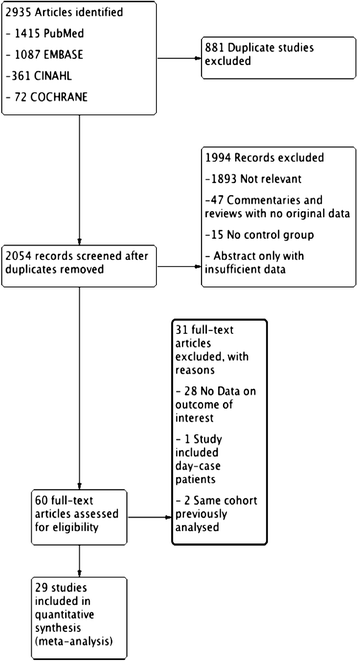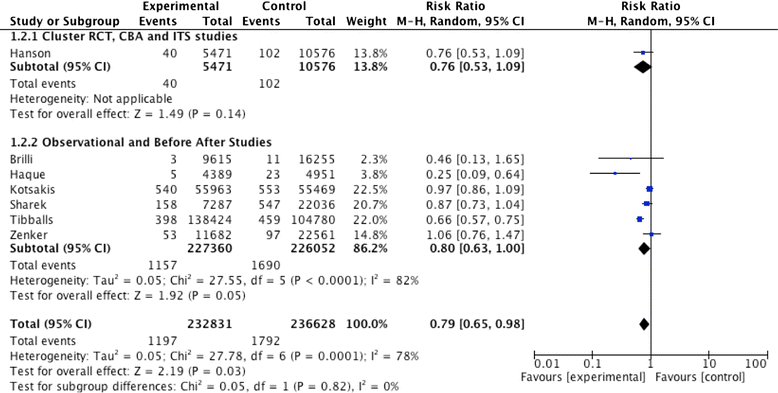Rapid response systems: a systematic review and meta-analysis
- PMID: 26070457
- PMCID: PMC4489005
- DOI: 10.1186/s13054-015-0973-y
Rapid response systems: a systematic review and meta-analysis
Abstract
Introduction: Although rapid response system teams have been widely adopted by many health systems, their effectiveness in reducing hospital mortality is uncertain. We conducted a meta-analysis to examine the impact of rapid response teams on hospital mortality and cardiopulmonary arrest.
Method: We conducted a systematic review of studies published from January 1, 1990, through 31 December 2013, using PubMed, EMBASE, CINAHL (Cumulative Index to Nursing and Allied Health Literature) and the Cochrane Library. We included studies that reported data on the primary outcomes of ICU and in-hospital mortality or cardiopulmonary arrests.
Results: Twenty-nine eligible studies were identified. The studies were analysed in groups based on adult and paediatric trials that were further sub-grouped on methodological design. There were 5 studies that were considered either cluster randomized control trial, controlled before after or interrupted time series. The remaining studies were before and after studies without a contemporaneous control. The implementation of RRS has been associated with an overall reduction in hospital mortality in both the adult (RR 0.87, 95 % CI 0.81-0.95, p<0.001) and paediatric (RR=0.82 95 % CI 0.76-0.89) in-patient population. There was substantial heterogeneity in both populations. The rapid response system team was also associated with a reduction in cardiopulmonary arrests in adults (RR 0.65, 95 % CI 0.61-0.70, p<0.001) and paediatric (RR=0.64 95 % CI 0.55-0.74) patients.
Conclusion: Rapid response systems were associated with a reduction in hospital mortality and cardiopulmonary arrest. Meta-regression did not identify the presence of a physician in the rapid response system to be significantly associated with a mortality reduction.
Figures




Comment in
-
The medical emergency team - current status and future directions: a perspective for acute care physicians.Intern Med J. 2023 Jun;53(6):888-891. doi: 10.1111/imj.16118. Intern Med J. 2023. PMID: 37349279 No abstract available.
References
-
- Buist MD, Jarmolowski E, Burton PR, Bernard SA, Waxman BP, Anderson J. Recognising clinical instability in hospital patients before cardiac arrest or unplanned admission to intensive care. A pilot study in a tertiary-care hospital. Med J Aust. 1999;171:22–5. - PubMed
Publication types
MeSH terms
LinkOut - more resources
Full Text Sources
Other Literature Sources
Medical

